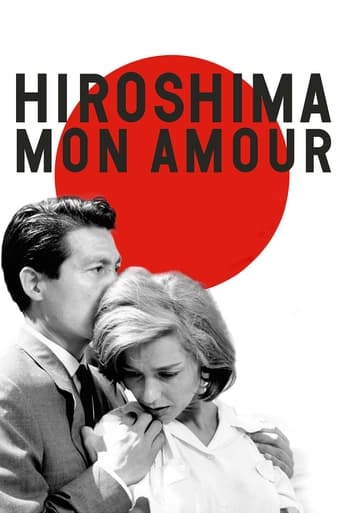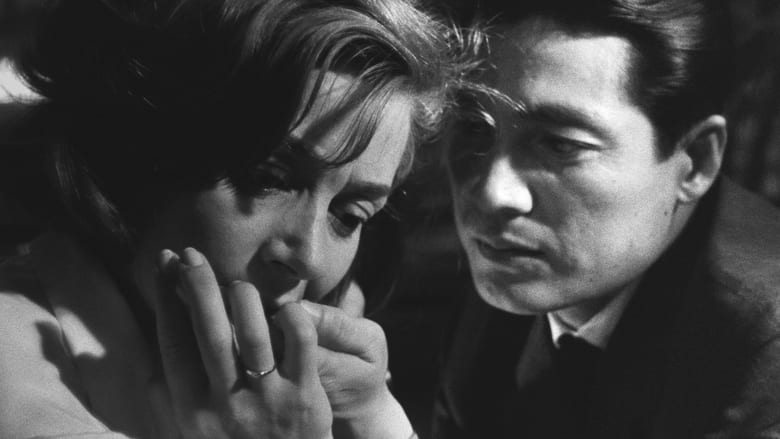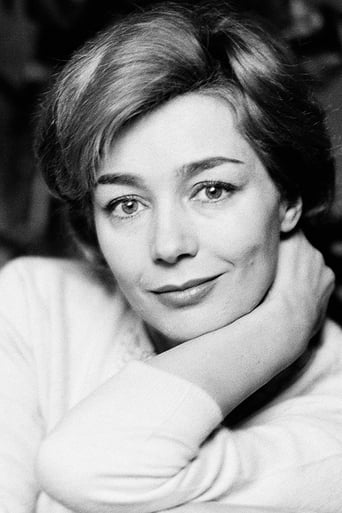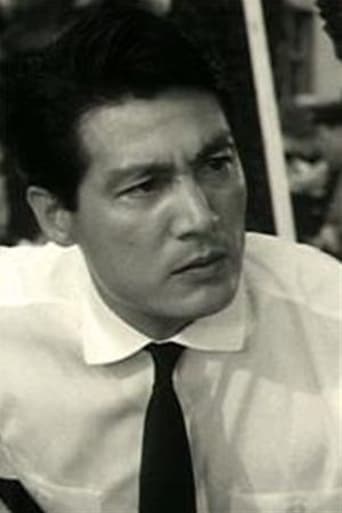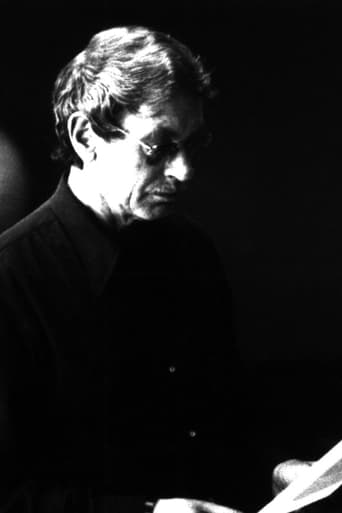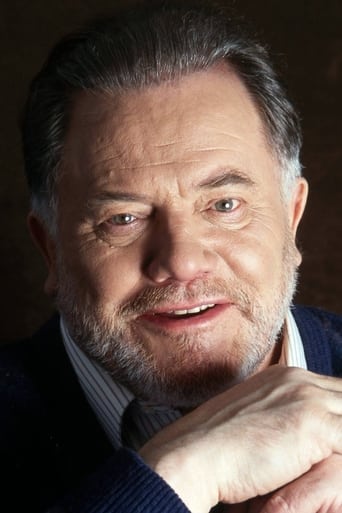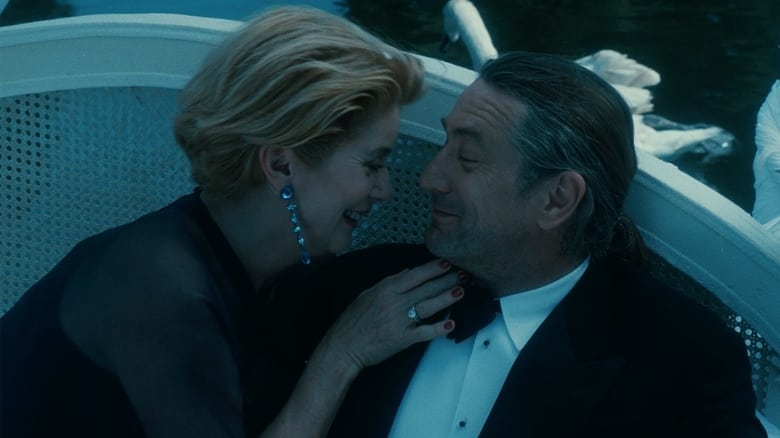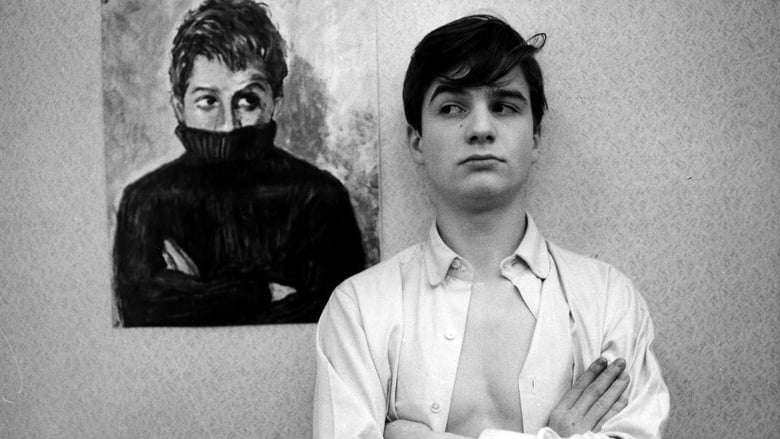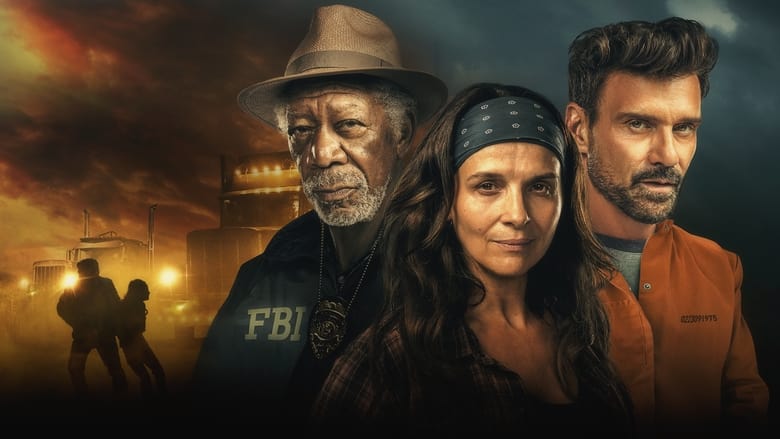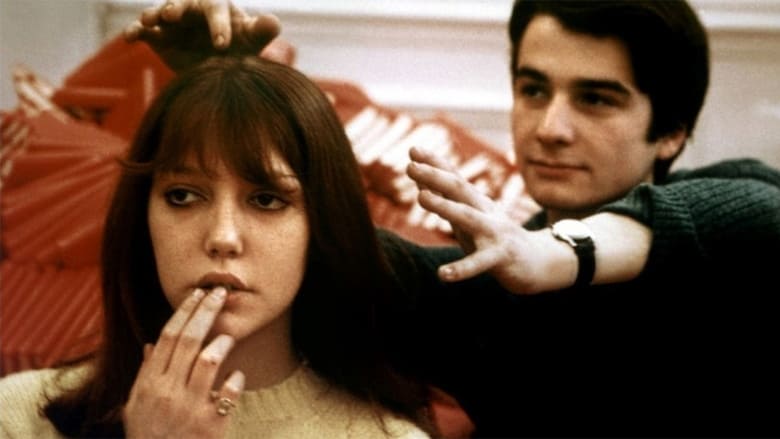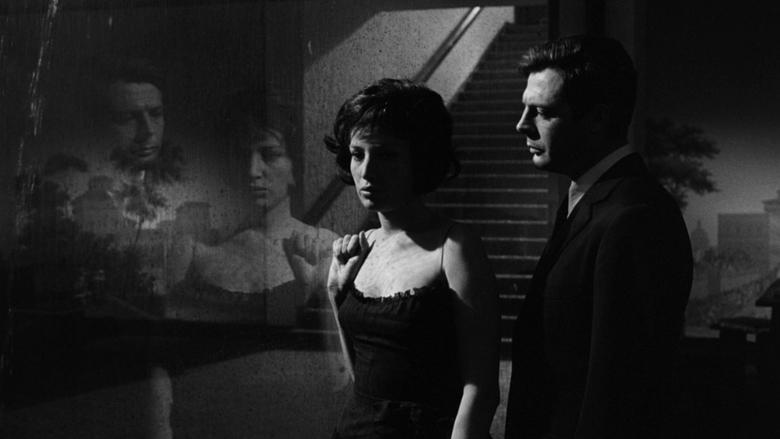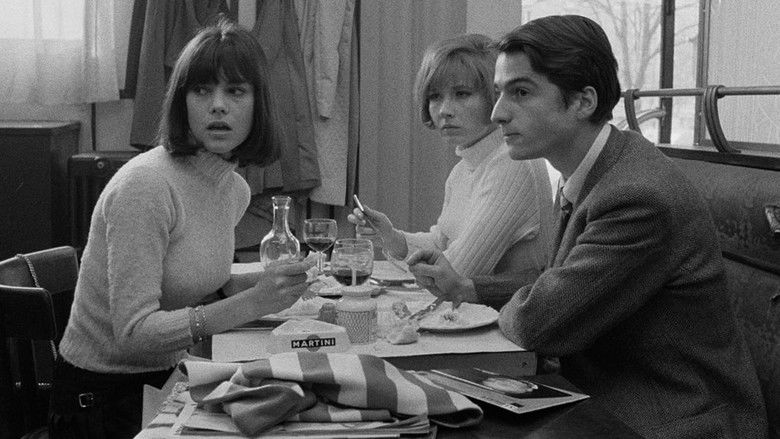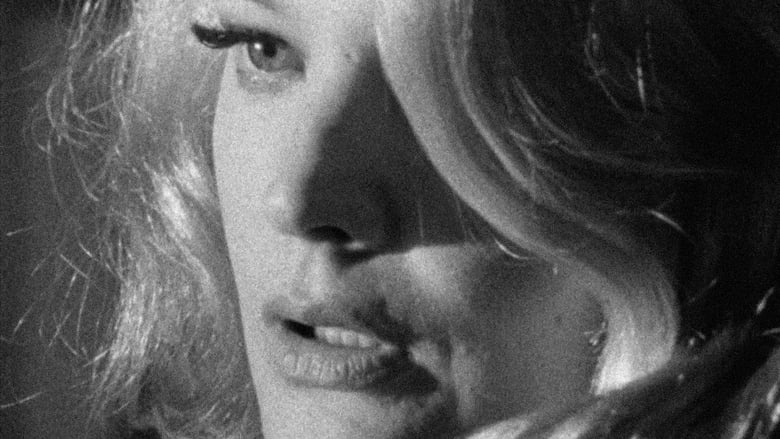The deep conversation between a Japanese architect and a French actress forms the basis of this celebrated French film, considered one of the vanguard productions of the French New Wave. Set in Hiroshima after the end of World War II, the couple -- lovers turned friends -- recount, over many hours, previous romances and life experiences. The two intertwine their stories about the past with pondering the devastation wrought by the atomic bomb dropped on the city.


Similar titles
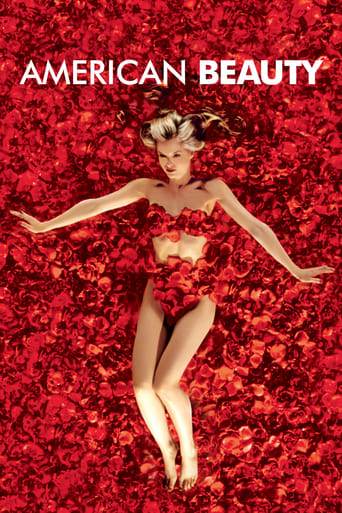
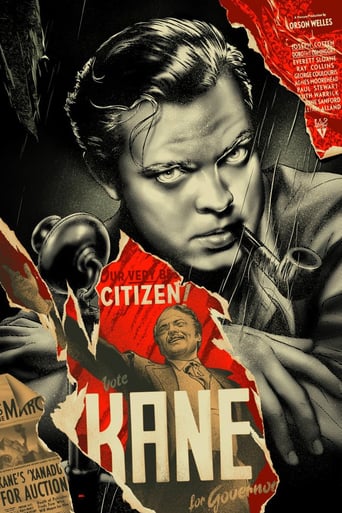
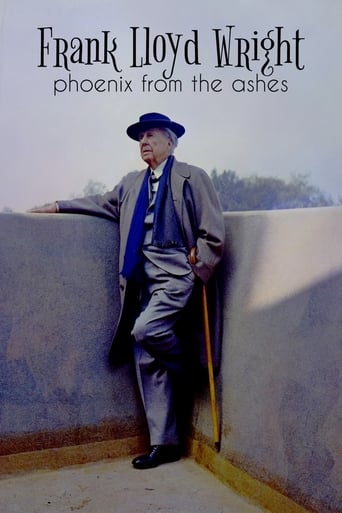
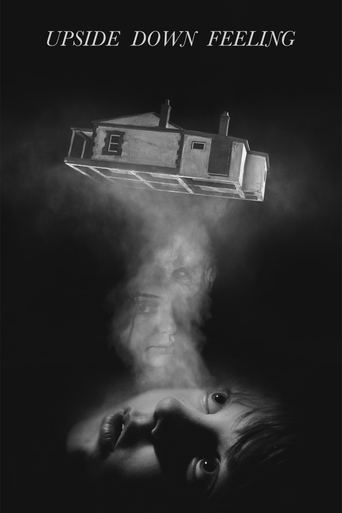
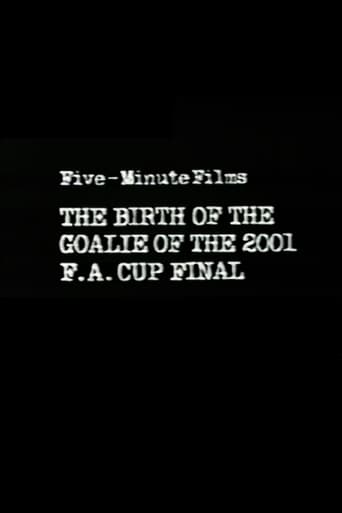
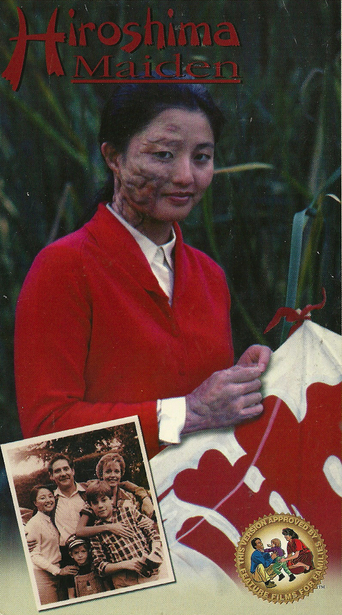
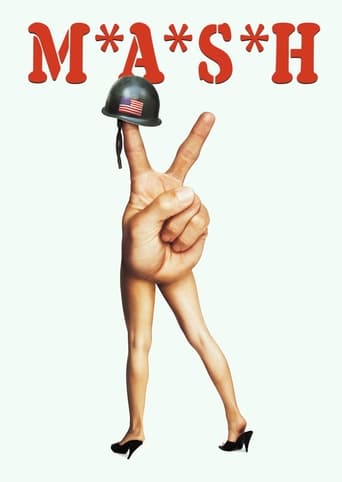
Reviews
Two lovers are entwined in embrace, shot in close-up so that their bodies are twisted and joined together but their identities obscured. And then ash and sand suddenly cover every spot of their skin, and the historical and emotional baggage begin to weigh down on what would normally be a simple tryst, a quiet little affair. It is the horrific aftermath of Hiroshima soiling the bed and their passion. The woman, played by Emmanuelle Riva, is engaging in pillow talk of the most macabre kind, and the man, later revealed to be the Japanese and French speaking Eiji Okada, is busy shushing her and stroking and kissing instead. Only later does Resnais reveal what would add extra weight to these whispers; he was a soldier in the war while the bomb eradicated the city and his family - she a nurse, then actually an actress, and long ago chastised for crossing the boundaries that war so harshly marks. Resnais is one of the few directors to have mastered the flashback, which is an easy tool to incorporate but harder to submerge it within the consciousness of the character that revisits the past. In first and foremost the haunting Night and Fog, and later Marienbad and Muriel, among others of his repertoire, he crafted a use for the technique not as a storytelling device to convey information but as a way of investigating the tricky nature of memory and truth - and how they can be warped over time. Amidst the longer journeys into the past, Resnais imbues a sense of selective and wilful forgetfulness into his documentary-type footage. His compositions show the wide extent of the devastation of the a- bomb, and then jump back into the more immediate past, where the camera tracks faceless visitors of the museum that contains all the irrevocable evidence. He will align the camera with a figure walking through the hospitals and seeing the patients with its own eyes, only for Okada to quickly interrupt with an objection of this first hand experience. This is contested with harrowing images that speak for themselves; masses of lost hair, scraps of twisted metal, insects emerging from the ash and bodies with all sorts of deformations - only to dissolve to the pair stroking and whispering of each other's beautiful skin, actions which slowly begin to become laden with guilt. The pair's dialogue reveal themselves to be more or less realists about the whole situation. They work in strange and sometimes foreign locations, far away from the family - their short-lived affairs are symbolic of the post-war displacement of the family unity. They have done this before, and expect to do this again. The woman freely flaunts her 'dubious morals', more risqué than most of the women of the screen of her time, and playfully assumes the man will feel the same way when she has to leave the next day. But Resnais probes, using one of his favoured techniques, and pieces of memory begin to emerge from this front: a brief match-cut flashing a likeness to one of the corpses of the past. Drink lowers the last of her inhibitions and she bravely recounts her tale. The visual mastery of the film is evident. Whilst she excavates the past and the camera drifts along the river Nevers, bicycling in the open fields and her butchered hair paraded through the streets in full daylight, the darkness of the bar closes in on the pair until Riva's pale face is the last refuge in almost pitch black. She is slowly positioned to have the reflections of the river hit her eyes as she gets deeper into her story, until ghostly tendrils and wisps of feeble light dance over her profile and softly illuminate the single tear falling from her left eye while the right side is all but submerged. And when she walks along the streets of the city at night Resnais employs a dramatically skewed low angle so the buildings, dark as they are and flickering with cold light, tower over her tiny figure, emblematic of a modernity that has left the human behind. Hiroshima mon amour was made in the aftermath of one of the more frightening events in our recent history. It depicts a time where the bomb, a symbol for the wider technological advancements of the age, was thought by some to be overshadowing and overpowering human nature. We had knowledge and use of guns and missiles before, but never had mass murder been quite so impersonal, and never had we been able to wield a weapon with such deadly potential for long term devastation. It was technology beyond moral sense, and more sophisticated than the human spirit and intelligence that had designed and overseen its deployment. The film fashions its response in the personal connection of two lovers in the newer, stranger Hiroshima, still trying desperately to rebuild and move on from the past. First, they convince themselves this is like any other affair they have embarked on, and that in a few years all will be forgotten. Then, they try to bury history but in doing so only unlock past traumas. They seek solace in physical action, and a hope that time will stop for them (throughout Okada is attempting to convince her to extend her stay) - again, a fruitless endeavour. It is finally through a refusal of denial that they find a new starting point. The mistakes of the past are voiced clearly and out loud, and only then can we begin to move forward.
Before starting to write about my thoughts on the film, I need to say that Akira Kurosawa's one of the masterpieces, Rhapsody in August and Wong Kar Wai's masterpiece In The Mood for Love are two of my all time favorite movies. Hiroshima Mon Amour is similar with those movies in terms of theme and style both, but it cannot be as touching and impressive as those movies. Resnais overly uses voice over technique in this movie and after a while it becomes almost unbearable, because poetic structure surpasses realism. It is like the movie is built on memoirs, so you feel like the characters aren't there really. The movie is not only a love story, but also it tries to be an elegy for the tragedy, Hiroshima Nagasaki, however, the movie can't handle all these themes including the woman's past as the third story. So what is the movie about? A forbidden love story? A woman's past tragedies? An elegy for Hiroshima Nagazaki? or all? The film could be poetic, romantic, but it is not that subtle or deep or beautiful in my opinion. On Hiroshima Nagazaki, Rhapsody was much better. On love, Fa Yeung Nin Wa was much better. As for the actor, the actress and overall acting, I didn't know the male lead, also I didn't know that the female lead is Amour's great Emmanuelle Riva at that time, however, unfortunately I have to say that Riva'a acting in this movie was weak and the man was not better than her. It is interesting that Riva reminded me Monica Vitti, the most beautiful European actress ever along with Claudia Cardinale for me, but the funny thing is that I don't adore Mrs. Vitti's acting either. By the way, I believe that this movie is mostly for women, women's favorite movie, it rather affects women like Jodie Foster's The Brave One (as I know, some female audiences cheered up in the finale of that movie) Also, I couldn't empathize with the woman, I couldn't feel her, I couldn't empathize with the man either, probably the dead pan story telling. I couldn't feel the passion in the love story, in fact I couldn't see love in this film, in contrast I found it uninspired. The ceremony scene in the middle of the movie was memorable, it reminded me Rhapsody again and other than this, the only scene I found interesting and memorable was two walk separately in empty streets, neon lights on the buildings... I would want to learn more about the relationship of the couple, I would want to get to know them more. This is not a relationship movie, my big disappointment was partially because of this, I had expected a different, touching and deep relationship movie, but it was not. The movie doesn't focus on a certain theme and I couldn't decide whether the woman'a past was necessary or not? Because it changes everything. The love story isn't pretentious may be as the hype claims, but it is vapid and dull for sure (not like Fa Yeung Nin Wa) I am not a cinema historian, I am not a professional critic who feels obliged to be objective or I am not an audience who only considers technical aspects and cinematic breakthroughs and personally I look for emotion in movies and despite this film is considered to be one of the most romantic and poetic movies of all time, I couldn't find it.
This movie is boring. Marguerite Duras sucks. I've been in love and gotten freaky with lovers and it was not like this. It was a lot more interesting than this. Want to make a Hiroshima movie? Make a movie about the dude with the burned-off lips. Show a day in this guy's life. The woman played by Emmanuelle Riva is unbearable. The Japanese dude is happy he got a piece of Western tail. The whole thing feels like the fantasy of a hysterical, frigid woman. My life is sad. I have an incurable disease. I am depressed and when I go to the movies I want to see Life. I wanted to burn something after seeing this film. I am a man and when I see this kind of self-indulgent feminine sterility on screen it drives me crazy, just as I imagine it drives women crazy to see the male equivalent...stuff like Armageddon or whatever. There was a pretty girl in the theater and I would have liked for her to think I was poetic and sensitive but after an hour of "poetic" dialogue I walked out. The babe probably thought less of me. I don't need her anyway. Who am I kidding? Of course I need her.
This is the greatest cinematic experience I've had since I saw In Cold Blood back in 2009. It's a simply hypnotic and enthralling film, both technically - with perfect direction, acting, screenplay, cinematography, editing and score - and emotionally. Simply some of the most incredible and poetic filmmaking I have ever seen. It hit me hard. Real hard. It has everything. Stripped down and there. I want to let it sink in more before I give a proper examination and analysis. I intend to do a series of my 10/10 films after my 10/10 albums one, so I will do a review that does the film justice then, or maybe beforehand if I feel I can adequately and eloquently express what this film means to me beyond 2 paragraphs. In an extremely brief nutshell, it's about how heritage and memory defines you. And how that heritage and memory can be damaged. And how the human condition copes with this. And how it feels to be reborn. Hiroshima Mon Amour is a million things at once. It makes my top 10 of all-time.10/10
